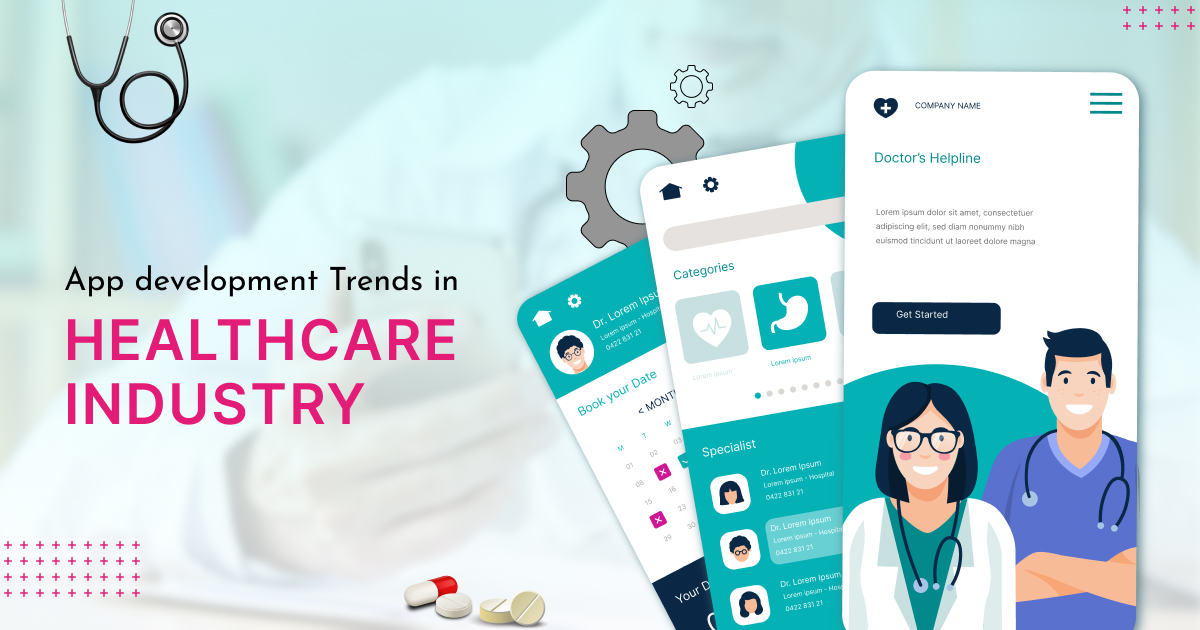- admin
- App Development
- Blogs
- 19th October 2023
App Development Trends In The Healthcare Industry
With smartphones becoming a necessity in our daily lives, global industries are introducing ample applications to attract customers, ease services, and stay ahead of the market. With every industry becoming advanced in terms of new trends, healthcare has also adopted smart technologies and applications to pave the way for an innovative and seamless future. This article is majorly based on the trending technologies taking over the healthcare industry.
Blockchain Technology In Healthcare Industry
We may have heard about blockchain technology before and are aware of its close relationship to cryptocurrencies like Bitcoin. But it’s intriguing to be curious about how this cutting-edge technology is used and put into practice in the healthcare industry.
The maximum level of data encryption will be utilized to monitor and preserve patient data, which is amongst a responsibility that blockchain technology will play in this situation. It is thought to be a rather demanding endeavour that will get simpler with its implementation.
In reality, one of the main reasons why the majority of health apps failed to retain users was that they did not offer a secure environment to protect data.
Your healthcare solution is strengthened by blockchain technology, which creates a decentralized, transparent log of medical records, becoming a suitable option for healthcare security applications.
The Artificial Intelligence Will Prevail in Healthcare
The current technology known as artificial intelligence has given several industries, particularly the healthcare sector, full control over their future.
In the period between 2022 and 2028, AI is anticipated to revolutionize the pharmaceutical and biotechnology industries with its ideas for startups in natural language processing, robotic process automation, and clinical trial participant identifiers as the landscape of healthcare technology shifts towards becoming more intelligent.
In situations where urgent medical care is necessary, artificial intelligence can assist with more accurate patient examinations.
The most recent AI innovations will enable computers to make choices on their own, even in the absence of medical personnel.
Patients won’t need to frequently visit clinics and hospitals, which will undoubtedly reduce the cost of medical expenses.
The Telemedicine Services To Thrive In The Healthcare Sector
Without any doubt, telemedicine has introduced a profound transformation in the healthcare sector. In rural locations with poor medical facilities, telemedicine is a helpful asset that is also reasonably priced.
The idea of consulting doctors, psychologists, physical therapists, and lactation consultants is introduced by the telemedicine application, along with the concepts of on-demand online consultation slot booking, e-prescription production, video conferencing-based consultation, and many other things.
In fact, patients are becoming more and more aware of telemedicine, and even doctors believe it provides quick and superior results in therapy.
Since there has been a considerable decrease in hospital readmissions, more people are actually finding satisfaction with the services they use.
Incorporating The Internet Of Things In Healthcare Industry
A number of businesses are getting impacted by the Internet of Things (IoT). The healthcare industry is likewise moving toward the implementation of IoT solutions.
The IoT-connected health applications will handle both patient comfort and comprehensive healthcare. The technology, which is also known as Remote Patient Monitoring (RPM), will also be helpful in gaining access to important patient data and tracking his development. This technique is quite helpful, especially for patients receiving remote treatment for chronic medical conditions.
To perform better operations during the course of the treatment process, the Internet of Things can easily be connected with some very sophisticated gadgets and medical equipment. Additionally, it will offer much more precise information.
Wearable-generated Personalized Health Data
Modern basic healthcare and fitness tracking apps create customized dashboards and healthcare/fitness diet and exercise plans using regular data updates from your actions provided by linked wearables.
Developing healthcare wearables apps with data personalization enablement is undoubtedly a solid investment, as the wearables market has seen a significant increase since the COVID-19 epidemic.
The Cloud-based Technology Attracting Of The Healthcare Sector
Any healthcare practitioner will tell you that organizing and keeping track of patient data and documentation is one of the most difficult jobs. Cloud-based solutions, on the other hand, would make a lot of these activities simpler than they were previously.
Big Data Analytics In Healthcare
Big data analytics has remained popular ever since it was introduced, and the healthcare industry is one of those sectors. Big data analytics solutions must be implemented and integrated into your healthcare app due to the industry’s rapid data generation.
More specifically, this helpful resource falls into three major areas.
It is connected to resource management, to start. Big data has been very helpful in the hospital’s efficient management of its sources, including hospital personnel and medical professionals (doctors, nurses, etc.). It also offers insightful information on which patients require immediate care and how staff members should support them.
Mobile health apps have benefited greatly from the availability of electronic health records, which let users save their medical details digitally. Everything would be included, such as their height, weight, medical history, medications they use, blood and sugar levels, etc.
In reality, predictive analytics is a combination of EHRs and big data. It is a document with a tonne of information that allows you to accurately forecast the best course of treatment for the patient based on the diagnosis of their illness. It would also provide you with an appraisal of the patient’s expected recovery time, among other things.
To Conclude With
The healthcare industry is adopting digital trends and is all set to offer its patients a cutting-edge experience. These advances in the healthcare sector are anticipated to introduce a new horizon and enable employees to experience improved services.
If you are a healthcare service provider and want to introduce our smart application to your customers. Reach out! Our consulting services and experts will help you with the top-notch services and solutions.

